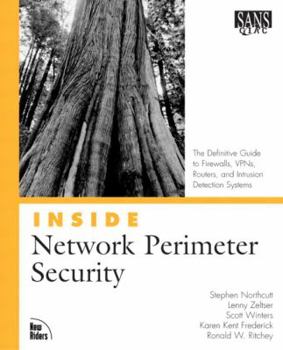Inside Network Perimeter Security: The Definitive Guide to
Select Format
Select Condition 
Book Overview
The need for valuable resources covering network perimeter security has never been greater. Inside Network Perimeter Security, 2E consolidates the perimeter security experience of leading SANS experts... This description may be from another edition of this product.
Format:Paperback
Language:English
ISBN:0735712328
ISBN13:9780735712324
Release Date:January 2002
Publisher:Sams
Length:712 Pages
Weight:2.64 lbs.
Dimensions:1.5" x 7.4" x 9.1"
Customer Reviews
5 ratings
Network Security Book
Published by Thriftbooks.com User , 17 years ago
This is an excellent book. Authors do not assume that you already know. So, every network element is explained in details from a security perspective.
WOW!
Published by Thriftbooks.com User , 18 years ago
What a book...As a relative new comer to IT security I'm digesting all I can lay my hands on. This book by SANS Institute is a rare gem. It starts easy and escalates subject by subject. This is the kind of book where I read a chapter, think about it for a week or so, then pick it up for another chapter. There's just too much for me to blast through, and gather all the knowlege. I award 5 stars and I'm not even finished yet
Excellent book at discussing how to defend your network perimeter
Published by Thriftbooks.com User , 18 years ago
This review is for the 2nd edition of this book. "Inside Network Perimeter Security" (INPS) by Northcutt, Zeltser, Winters, Kent, and Ritchey suitably covers the broad topic of securing a network's edge. The book is based, on part, from various SANS Institute training material (Northcutt is the CEO of the SANS Institute). Most of the items documented in INPS are honed from years of discussions in classes (and is mentioned an `excellent supplementary resource" for the GIAC Certified Firewall Analyst (GCFW)). The book first focuses on perimeter fundamentals - including dedicating about 100 pages to the three main types of firewalls (Packet, Stateful & Proxy). The second section discusses how to fortify other areas of the perimeter - by implementing hardened routers and hosts, VPNs, IDSs, and IPS. The third section discusses designing a secure perimeter from the ground up (consider it best practices). This includes a much-needed chapter on wireless security. The last section is how to monitor and maintain the perimeter. It is hard to characterize who this book should be aimed at. While configurations examples are given for many different platforms and OSs, the configs cannot be considered complete. I feel this book would serve network admins well as a starting point and as introduction to concepts that they might not be familiar with. Some items I like from Inside Network Perimeter Security: -Chapter 6 gives a great discussion on Cisco routers. What really impresses me is, since the documentation is from someone besides CiscoPress, you get an idea of other ways to harden Cisco routers (see the telnet trick on page 142). The first appendix also gives a great collection of different ACLs (consider it an update of the NSA's list). I have over 50 CiscoPress books, and information found in these 2 chapters I have not seen documented in any CiscoPress book. -Chapter 21 provides a `quick' list of tools to use to help troubleshoot and isolate an issue. While there are some great books that are wholly dedicated to showing the ins-and-outs of different tools, sometimes you can't see the trees through the forest. Within just a few short pages, INPS is able to suggest a plethora of different tools to use based upon the issue. The book mentions that it's goal "...is to create a practical guide for designing, deploying, and maintaining a real-world network security perimeter." I believe they have done just that! I give this book 5 pings out of 5: !!!!!
A practical, easy to digest compendium of the best practices for prevention of intrusions
Published by Thriftbooks.com User , 19 years ago
Inside Network Perimeter Security by the team of Stephen Northcutt, Lenny Zeltser, Scott Winters, Karen Kent, and Ronald W. Ritchey. deftly consolidates the perimeter security experience of leading SANS experts into a practical, easy to digest compendium of the best practices for prevention of intrusions and defense against those intrusions that do succeed. Starting from the essentials of perimeter security, readers will methodically and effectively work their way through fortifying the security perimeter, designing a secure network, and maintaining and monitoring the security of the network.
state of the art
Published by Thriftbooks.com User , 19 years ago
The authors provide a nicely detailed explanation of current network defenses and practises. Each major topic in this field is well covered. Firewalls and packet filtering are clearly done. The preferred choice of example router is from Cisco. But the principles are obviously applicable to devices from any competing vendor. The book also recommends egress filtering; which is not often discussed in other texts. It helps guard against your net being used to send out malware. This helps the overall environment of the Internet. Moreover, there is also a tangible benefit to you. By doing egress checks, you can detect if one of your machines has been subverted. Which is always good to know. VPNs are given an entire chapter, due to their importance. The book also goes beyond talking about Intrusion Detection Systems to discuss Intrusion Prevention Systems. More proactive. To some sysadmins, the most important chapter might be that on wireless networks. As these have grown hugely, so too have the attacks against them. You can learn how to bolt down your wireless network.





